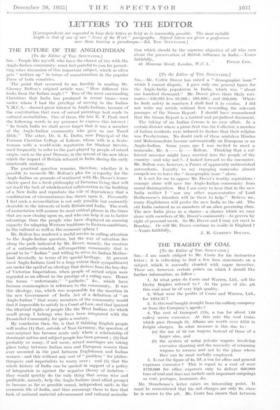LETTERS TO THE EDITOR
[Correspondents are requested to keep their letters as brief as is reasonably possible. The most suitable length is that of one of our " News of the Week " paragraphs. Signed letters are given a preference over those bearing a pseudonym.—Ed. THE SPECTATOR.]
THE FUTURE OF THE ANGLO-INDIAN
[To the Editor of TILE SPECTATOR.]
Sin,—People like myself, who have the closest of ties with the Anglo-Indian cominunity, must feel grateful to you for permit, ring sober discussion of this important subject, which so often gets " written up " in terms of sensationalism in the popular Press of both countries.
The point that occurred to me forcibly in reading Mr. Glorney Bolton's original article was, " How different this looks from the Indian angle ! " Two of the most outstanding Christians that India has produced in recent times—men under whom I bad the privilege of serving in the Indian Y.M.C.A,—showed great interest in Anglo-Indians, because of the contribution that men of mixed parentage had made to cultural assimilation. One of them, the late K. T. Paul, used the following words in my presence to express this interest : " In South India we shall never forget that it was a member a the Anglo-Indian community who gave us our Tamil :Bible." The other, Dr. S. K. Datta, now Principal of the Porn uoi Christian College at Lahore, whose wife is a Scots- woman with a world-wide reputation for Student Service, used frequently to refer to the part played by people of mixed origin, such as the poet Derozio, in the spread of the new ideas which the impact of Britain released in India during the early nineteenth century.
The practical question remains, therefore, whether it is possible to reconcile Mr. Bolton's plea for sympathy for the Anglo-Indian on grounds of sentiment with Mr. Dover's icono- clastic quest for a fresh philosophy of Eurasian living that will set itself the task of wholehearted collaboration in the building of a New India and repudiate the rae of dependency that a combination of circumstances has thrust upon it. Personally I feel such a reconciliation is not only possible but eminently desirable in the interests of both Brituiiiand India. The work of assimilation will assume its most critical phases in the times that are now closing upon us, and who can help it on to better advantage than the people who have displayed an amazing capacity for adapting Western traditions to Eastern conditions, in the cultural as well as the economic sphere ?
Mr. Bolton has rendered a useful service in calling attention to the Anglo-Indian question, but the way of salvation lies along the path indicated by Mr. Dover, namely, the creation of a nationally-minded, self-respecting conununity that is proud to be " Indian " and willing to serve its Indian Mother- land devotedly in terms of its special heritage. At present most Anglo-Indians (and to a large extent their sympathisers) RTC under the spell of an ideology that derives from the hey-day of Victorian Imperialism, when people of mixed origin were regarded as an affront to the prestige of a ruling race. Hence the terms " unfortunate," " pathetic," &c., which have become commonplace in reference to the community. It was this ideology, too, which was responsible for the insertion in the new Government of India Act of a definition of " an Anglo-Indian " that many members of the community would find it impossible to satisfy in a Court of Law, and that ignored the identical rights of people like the West Indians (to which small group I belong) who have been integrated with the Domiciled Community for quite a century.
My conclusion then, Sir, is that if thinking English people will realise (1) that, outside of Nazi Germany, the 'question of race-mixture has become acute only where a relationship of dominant nation and subject people has been present ; (2) that probably as many, if not more, mixed marriages are taking place today between Indian men and European women than ever occurred in the past between Englishmen and Indian women—and this without any sort of " problem " for philan- thropists and imperialists to worry over ; and (3) that the whole history of India can be quoted in support of a policy of integration as against the negative theory of isolation— they Would quickly do the only thing that seems wise and profitable, namely, help the Anglo-Indians (and allied groups) to become as far as possible sound, independent units in the economic life of India, and thus encourage them to face that task of national material advancement and cultural assimila-
tion which should be the supreme objective of all who care about the preservation of British influence in India.—Yours
faithfully, Purim, Cog. 41 Museum Sheet, London, W.C. 1.










































 Previous page
Previous page